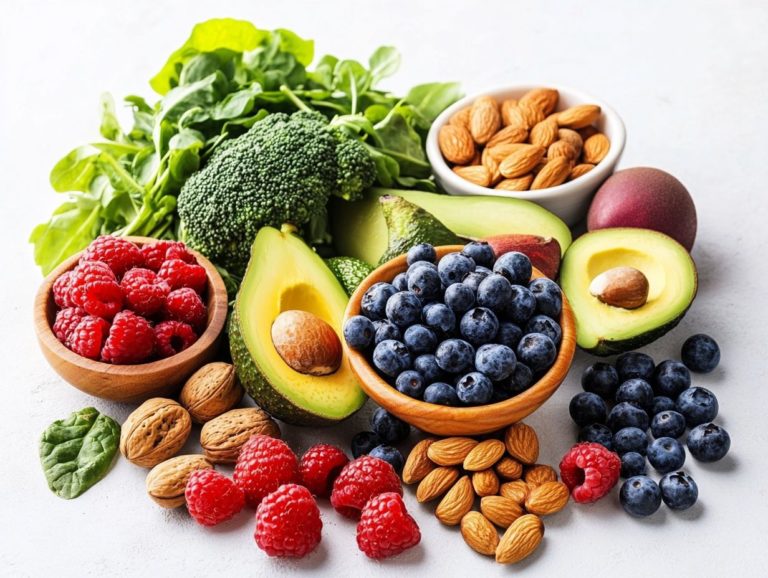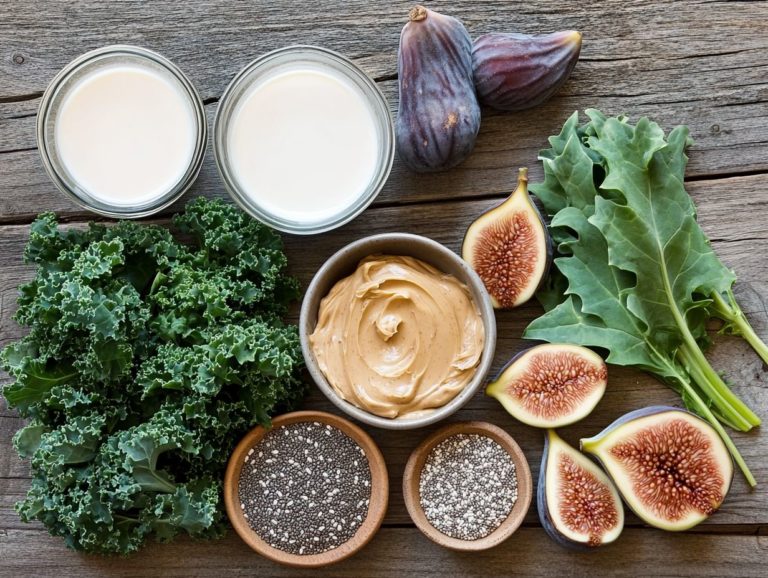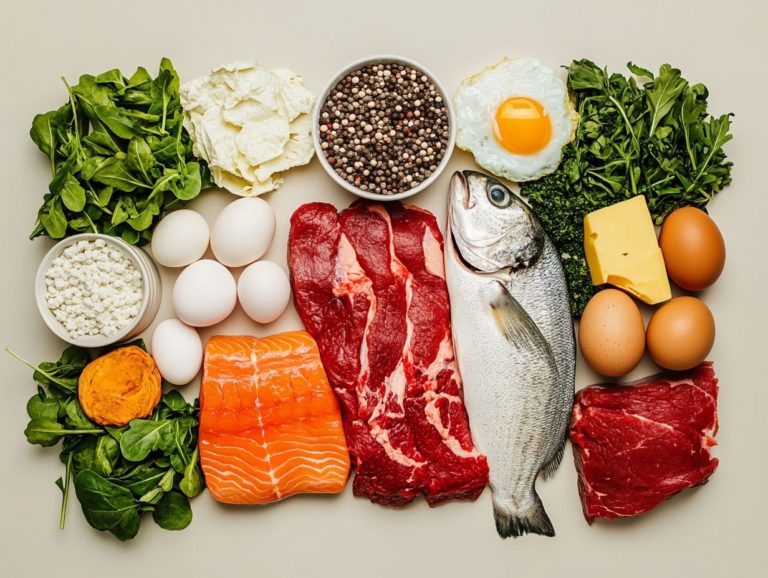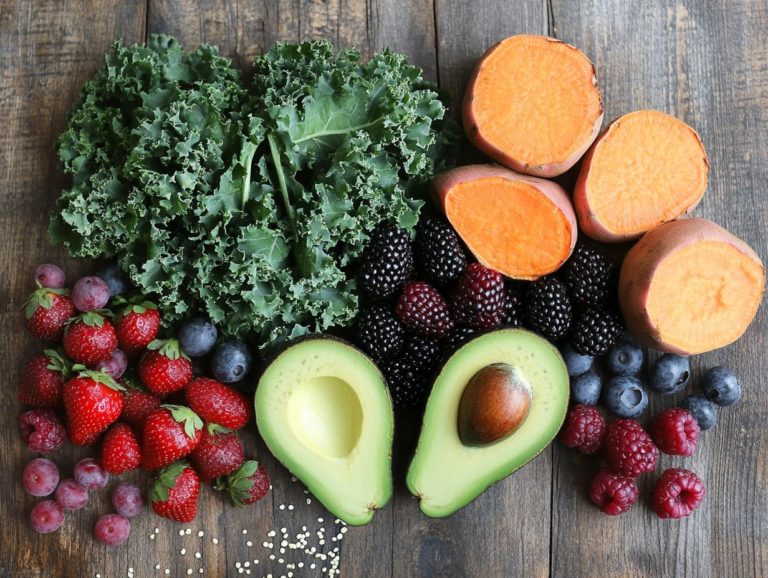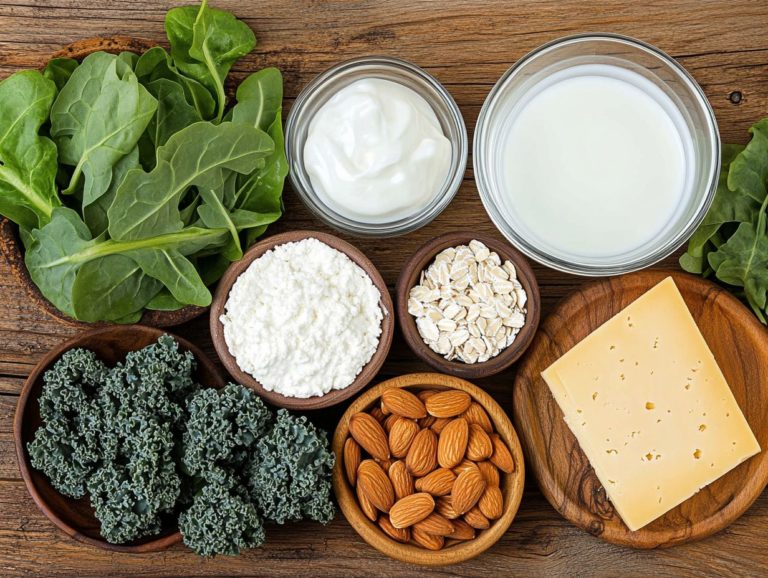5 Foods to Combat Vitamin D Deficiency
Vitamin D, often referred to as the sunshine vitamin, is crucial for maintaining your overall health. Despite its importance, many individuals find themselves deficient in this essential nutrient, which can lead to a range of health complications.
This article delves into five powerhouse foods that can effectively combat Vitamin D deficiency. You ll gain insights into symptoms, risk factors, and practical strategies to elevate your Vitamin D levels.
Uncover not just what to eat, but also discover how to seamlessly incorporate these delectable options into your daily routine, paving the way for a healthier you.
Contents
- Key Takeaways:
- 1. Fatty Fish
- 2. Fortified Foods
- 3. Egg Yolks
- 4. Mushrooms
- 5. Sun Exposure
- What Is Vitamin D and Why Is It Important?
- What Are the Symptoms of Vitamin D Deficiency?
- What Are the Risk Factors for Vitamin D Deficiency?
- How Can These Foods Help Combat Vitamin D Deficiency?
- What Are Some Other Sources of Vitamin D?
- Can Vitamin D Supplements Help with Deficiency?
- How Can One Maintain Adequate Vitamin D Levels?
- What Are Some Precautions to Take When Increasing Vitamin D Intake?
- What Are Some Other Health Benefits of Vitamin D?
- How Can One Incorporate These Foods into Their Diet?
- Frequently Asked Questions
- What are 5 foods that can help combat Vitamin D deficiency?
- Why is Vitamin D important for our bodies?
- What is the recommended daily intake of Vitamin D?
- Can I get enough Vitamin D from food alone?
- Are there any other benefits of consuming Vitamin D-rich foods?
- Can children also benefit from consuming Vitamin D-rich foods?
Key Takeaways:

- Fatty fish, such as salmon and tuna, are rich sources of Vitamin D and can help combat deficiency.
- Fortified foods, like milk and cereal, provide added Vitamin D and can be an easy way to increase intake.
- Egg yolks and mushrooms are natural sources of Vitamin D and can be incorporated into meals to boost levels.
1. Fatty Fish
Fatty fish, such as salmon and tuna, are great sources of Vitamin D. This nutrient is crucial for calcium absorption, muscle strength, and healthy bones.
If you’re looking to enhance your Vitamin D status, these fish are a recommended dietary choice. Other fatty fish, like mackerel and sardines, also offer impressive Vitamin D content, significantly contributing to calcium metabolism in your body.
This relationship is important, as adequate calcium levels support bone density and overall skeletal integrity. By incorporating these fish into your balanced diet, you not only support bone health but also play a protective role against chronic diseases.
Eating fatty fish regularly can lower your chances of heart disease and type 2 diabetes, largely due to their omega-3 fatty acids. Thus, making fatty fish a staple in your diet could be a proactive step toward long-term health and well-being!
2. Fortified Foods
Fortified foods, including milk, orange juice, and yogurt, serve as excellent avenues for enhancing your Vitamin D intake. These staples are enriched with this essential nutrient, effectively helping you combat Vitamin D deficiency while supporting immune function and bone health.
In addition to these familiar options, many cereals and plant-based milks are also fortified, making it convenient for you to increase your intake regardless of your dietary preferences.
For example, select brands of almond or soy milk boast impressive levels of Vitamin D, providing delightful alternatives for those who are lactose intolerant or following a vegan lifestyle.
Read labels carefully, as fortification levels can vary significantly from one product to another. By familiarizing yourself with the Vitamin D content in these fortified foods, you can more effectively meet the recommended dietary allowance, paving the way for a healthier lifestyle and reducing the risk of related health concerns.
3. Egg Yolks
Egg yolks are not just a delicious addition to your cooking options; they are also a powerhouse of nutrients, particularly Vitamin D. This vital vitamin plays a crucial role in meeting your daily requirements, promoting healthy bones and boosting your immune function.
In fact, egg yolks contain significantly higher levels of Vitamin D compared to many common food sources, like fortified milk or cereals. By incorporating them into your balanced diet, you can optimize your nutrient intake, as the fat in egg yolks enhances the absorption of fat-soluble vitamins such as A, E, and K.
Beyond their impressive vitamin content, these nutritional gems also offer essential fatty acids and choline, both of which support brain health and cognitive function. Therefore, adding egg yolks to your meals can elevate your overall well-being and ensure your body operates at its peak performance!
4. Mushrooms
Mushrooms offer a remarkable plant-based source of vitamin D, especially when they re exposed to sunlight. This exposure allows certain varieties to convert to vitamin D2, making them an excellent choice for anyone looking to boost their vitamin D levels without relying solely on animal products.
These intriguing fungi come in various species, such as maitake and shiitake, each bringing its own unique flavor and texture while serving as a fantastic source of vitamin D.
For those following vegetarian or vegan diets, incorporating these sun-kissed mushrooms is essential for preventing vitamin D deficiency, a common concern given the limited availability of this nutrient in plant foods.
By familiarizing yourself with different types of mushrooms and their sunlight exposure levels, you can improve your diet and support your health. Including these mushrooms in your meals not only diversifies your plant-based options but also significantly contributes to your overall well-being.
5. Sun Exposure

Sunlight exposure is your body’s most natural way to produce vitamin D. When UV light from the sun hits your skin, it starts the synthesis of this vital hormone, essential for maintaining healthy blood levels of vitamin D and overall well-being.
To enjoy the benefits of the sun while protecting yourself, it s crucial to embrace safe sun exposure habits. Dermatologists typically recommend limiting direct sunlight to about 15-30 minutes each day, depending on your skin type and location. This approach ensures adequate vitamin D synthesis without risking sunburn or long-term skin damage.
Consider using sunscreen with a high SPF, wearing protective clothing, and seeking shade when the sun is at its peak. These strategies help you balance basking in the sun s benefits while keeping your skin healthy.
By practicing mindful sun exposure, you can protect your skin while enjoying the essential advantages that sunlight offers.
What Is Vitamin D and Why Is It Important?
Vitamin D serves a dual purpose in your body: it’s both a nutrient you consume and a hormone your body produces. This vital substance plays a fundamental role in various bodily functions, including calcium absorption, muscle strength, and immune function.
It’s essential for maintaining healthy bones and preventing diseases like heart disease and type 2 diabetes. Health professionals stress the importance of ensuring adequate vitamin D levels, which you can find in dietary sources such as fatty fish, fortified dairy products, and egg yolks.
Clinical evidence suggests that vitamin D might influence the risk of certain health conditions, including cancers and autoimmune diseases, by modulating your immune response and reducing inflammation.
A deficiency in this crucial vitamin can lead to serious consequences, such as increased susceptibility to infections and chronic diseases. This highlights the need for regular monitoring and potential supplementation for optimal health.
What Are the Symptoms of Vitamin D Deficiency?
Symptoms of vitamin D deficiency can show up in various ways, including low blood levels, fatigue, muscle weakness, and a higher risk of bone fractures. This shows just how vital it is to ensure sufficient vitamin D intake for optimal health.
Beyond these physical signs, you might also notice mood swings, cognitive challenges, and a weakened immune response, making it essential to monitor your vitamin D levels regularly.
Observational studies have connected vitamin D deficiency with a greater prevalence of chronic diseases, including cardiovascular issues, diabetes, and autoimmune disorders.
A study published in the Journal of Clinical Endocrinology and Metabolism examined over 2,000 participants and uncovered a significant link between low vitamin D levels and increased mortality rates, emphasizing the importance of proactive health measures.
Don t wait understanding and addressing vitamin D deficiency is crucial not just for your physical health but also for enhancing your overall quality of life.
What Are the Risk Factors for Vitamin D Deficiency?
Several risk factors can lead to vitamin D deficiency. These include insufficient sunlight exposure, medical conditions, and diets low in vitamin D-rich foods.
This deficiency can result in a risk of weakening bones and a higher chance of autoimmune diseases.
If you reside in northern latitudes, your risk may be even higher due to limited sunlight, especially during the winter months when UV rays are scarce.
If you have darker skin tones, you might find it harder to produce vitamin D because the higher melanin content in your skin can inhibit sunlight absorption.
Lifestyle choices also play a significant role. Prolonged indoor activity and regular use of sunscreen can drastically reduce your opportunities for natural vitamin D production.
It’s crucial for specific demographic groups, like the elderly and those with chronic health conditions, to be vigilant. Their bodies may struggle more to maintain optimal vitamin D levels.
How Can These Foods Help Combat Vitamin D Deficiency?
Boost your health now by adding vitamin D-rich foods to your diet! Foods like fatty fish, fortified items, egg yolks, and mushrooms can help you fight deficiency and promote better health outcomes.
These nutrient-rich options not only deliver essential vitamins but also enhance your overall well-being by supporting bone health, immune function, and mood regulation.
For example, imagine starting your day with a breakfast of fortified cereals alongside scrambled eggs. It s a delicious way to kick off your morning!
At lunch, a plate of grilled salmon paired with saut ed mushrooms offers a savory nutrient boost.
By creatively combining these foods in your daily meals, you can effectively optimize your vitamin D levels and enjoy the maximum health benefits from your culinary choices.
What Are Some Other Sources of Vitamin D?
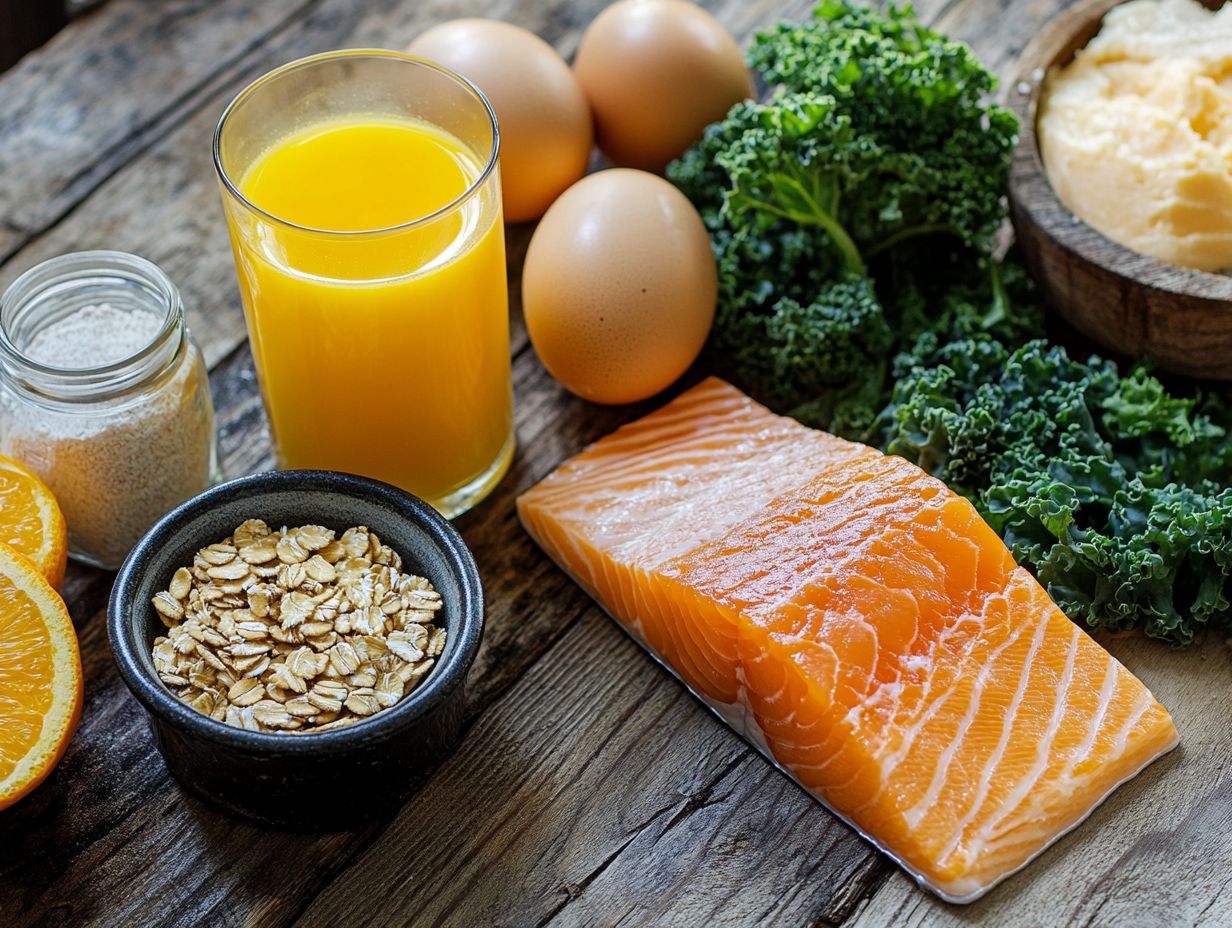
You might consider exploring other sources of vitamin D, such as supplements. These come in two forms: vitamin D2 (also known as ergocalciferol, often from yeast) and vitamin D3 (or cholecalciferol, usually derived from animal products).
Both can effectively elevate your vitamin D levels, especially if you’re finding it challenging to meet your needs through diet and sunlight alone.
Research suggests that vitamin D3 is generally more potent and stays in your bloodstream longer, making it a preferred choice for many individuals.
Supplementation becomes especially crucial if you live in areas with limited sunlight, during the winter months, or if you have dietary restrictions.
When selecting a product, it s wise to look for high-quality formulations that clearly specify the type and dosage of vitamin D. This ensures it aligns with your health needs.
Can Vitamin D Supplements Help with Deficiency?
Vitamin D supplements can be an effective solution if you’re facing a vitamin D deficiency. They help restore optimal levels and support your overall health, especially when your diet and sunlight exposure just aren’t cutting it.
These supplements come in various forms, like vitamin D2 and vitamin D3. You might find that vitamin D3 is often recommended because it offers superior absorption and efficacy.
Health professionals typically suggest a dosage based on your blood test results, which can help pinpoint your individual needs.
Monitoring your vitamin D levels is crucial. It allows you to track your progress and make necessary adjustments to your supplementation regimen.
Regular check-ups with your healthcare provider can provide guidance on when to increase or decrease your dosages, ensuring you maintain optimal health without the risk of toxicity.
How Can One Maintain Adequate Vitamin D Levels?
Maintaining adequate Vitamin D levels requires a blend of sunlight exposure, a balanced diet high in Vitamin D sources, and, if necessary, supplementation. This approach helps you meet your daily Vitamin D requirements and promotes overall health.
Aim for at least 10 to 30 minutes of sun exposure several times a week. Adjust your exposure based on your skin type and geographical location.
Incorporate foods that are high in nutrients, such as fatty fish, fortified dairy products, and egg yolks, into your daily meals to significantly boost your dietary intake.
Regularly monitor your Vitamin D levels through blood tests. Consult healthcare professionals for personalized recommendations, especially during sun-scarce months.
Embrace these lifestyle changes and seek expert guidance to take control of your Vitamin D status and enhance your overall well-being.
What Are Some Precautions to Take When Increasing Vitamin D Intake?
When considering an increase in your Vitamin D intake, it’s essential to take certain precautions. Consult health professionals to determine the appropriate dosage and avoid excessive intake that could lead to toxicity.
Evaluate your current Vitamin D levels through blood tests. This provides invaluable insight, allowing you to tailor your supplementation safely. Monitoring your blood levels prevents risks associated with excessive supplementation, such as nausea, weakness, and even kidney damage.
Remember, Vitamin D is vital for your health, but more is not always better. Adopt a cautious approach and stick to recommended guidelines to enhance your Vitamin D levels without compromising your health.
What Are Some Other Health Benefits of Vitamin D?
Beyond its critical role in supporting bone health, Vitamin D offers a range of health benefits. It enhances immune function, reduces the risk of heart disease, and may provide protective effects against certain cancers, making it a crucial nutrient for your overall well-being.
Recent studies highlight the connection between maintaining adequate Vitamin D levels and a lower incidence of autoimmune diseases, emphasizing its importance.
Research indicates that individuals with sufficient Vitamin D may experience improved mood and cognitive function, enhancing their quality of life. Additionally, this essential nutrient could aid in weight management and metabolic health, potentially lowering the risk of conditions like type 2 diabetes.
Given its numerous benefits, incorporating Vitamin D into your routine through sunlight exposure, dietary choices, or supplementation is vital for achieving and maintaining optimal health.
How Can One Incorporate These Foods into Their Diet?

Incorporating foods high in Vitamin D into your diet is straightforward and enjoyable. With meal-planning strategies, you can ensure adequate intake of this essential nutrient daily.
Start by adding fatty fish like salmon or mackerel to your weekly menu. These delicious options provide Vitamin D and omega-3 fatty acids that support heart health.
If you prefer plant-based alternatives, consider fortified foods enhanced with extra vitamins or minerals, such as almond milk or orange juice. You can experiment with mushrooms exposed to UV light by adding them to your salads or stir-fries for a nutritious boost.
On busy days, meal prep is your best friend! Batch-cook dishes featuring these ingredients and store them for quick, nutritious lunches.
Get creative with combinations try a creamy salmon pasta or whip up a Vitamin D-rich breakfast smoothie with fortified yogurt. These flavorful choices enhance both taste and nutritional value, making it easier to meet your dietary needs.
Frequently Asked Questions
What are 5 foods that can help combat Vitamin D deficiency?
Top foods to fight Vitamin D deficiency include fatty fish, fortified dairy products, eggs, mushrooms, and 5 foods to help you get enough vitamin A, such as fortified cereals.
Why is Vitamin D important for our bodies?
Vitamin D is important for strong bones and for supporting our immune system. It also helps our bodies absorb calcium and phosphorus.
What is the recommended daily intake of Vitamin D?
The recommended intake of Vitamin D varies by age and health. Generally, 600-800 IU (International Units) is advised daily.
Can I get enough Vitamin D from food alone?
Incorporating Vitamin D-rich foods is beneficial, but it can be hard to get enough from food alone. Try to get some sunlight or consider taking Vitamin D supplements.
Are there any other benefits of consuming Vitamin D-rich foods?
Yes! Eating these foods can boost your mood and lower the risk of chronic diseases. They also support healthy weight management.
Can children also benefit from consuming Vitamin D-rich foods?
Absolutely! Vitamin D is essential for children s growth and development. It’s recommended they get 400-600 IU each day.

